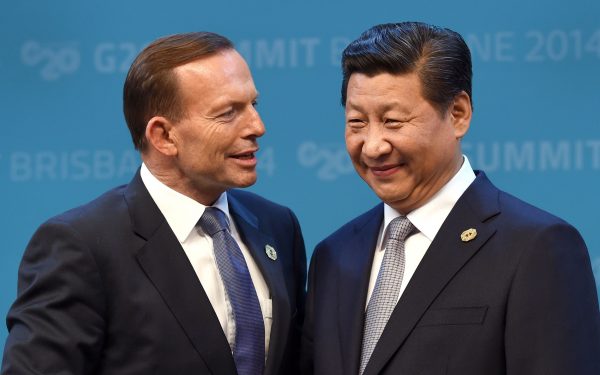It is perceptions like these that Abbott has the chance of a political lifetime to dispel when he has two bites of the cherry in November when Xi arrives in Australia for both the G20 and a state visit. If Abbott cannot rise to the occasion and at least assert that he — and he alone — is in charge of Australia’s bilateral relationship with China then the cynics will be able to claim their world view is right.
Free Trade Agreements are the easiest thing for people to understand and see self-interested benefits in. But this is not about FTAs. It is about the way that Abbott speaks about Australia’s relationship with its largest trading partner and a country becoming increasingly dominant in the region. If he can move beyond the platitudes of ‘win-win’ and articulate a joint vision of development, partnership and sustainability — that carries conviction in Australia and engages the Chinese — then he will have achieved more than his most recent predecessors. They were either hopelessly ambiguous, like Kevin Rudd, or tepid, like Julia Gillard. Abbott is starting from a low base, but he has to do better than this.
At the moment, the Australia–China relationship is like a novel without a plot. It meanders along, veering dangerously close to complacency, before sending the reader to sleep. In so many areas the relationship could be better. Australia’s strengths — as an innovator, a creative economy, a finance centre, and a partner in environment and sustainability challenges — should be better understood in China. Xi Jinping has an evident affection for the country. He has visited every state except Tasmania and will rectify this during his November visit. This should translate into real benefits for Australia. How many other countries have this sort of appeal to the dominant leader of the world’s second largest economy?
It is immensely challenging for Australia to articulate a unilateral policy towards China without receiving a late night call from Washington. Yet perhaps Abbott can take inspiration from two great examples as he navigates the next few weeks.
The first is the late Gough Whitlam whose vision on China still resonates today. Whitlam intuitively read the changed circumstances of the early 1970s — before public news of the US rapprochement with China — and beat his own path to Beijing as opposition leader. Whitlam’s instincts proved right and are still paying dividends four decades later. All of this without any real negative consequences from the US. If Whitlam could square the US–China circle in tougher times, Abbott should aspire to now.
The second figure is no less than Deng Xiaoping. Applying the ideas of the China’s former leader to Australia, Abbott needs to convey his vision of a nation that understands the intimate links between economic development and being a powerful modern state. A stronger Australian economy is a stronger Australia, period. And only a strong Australia in this space will be able to prosper and develop on all other fronts in the coming decades. Abbott and his colleagues speak of Australian values and principles and the need to stand by these. That is right. But the smartest tactic would be for Australia to exemplify these values by strengthening its economy through its confident relationship with China. Then it would truly be in a position to preach and be listened to.
Kerry Brown is Executive Director of the China Studies Centre and Professor of Chinese Politics at the University of Sydney, Associate Fellow at Chatham House, London, and the author of ‘The New Emperors: Power and the Princelings in China’.

